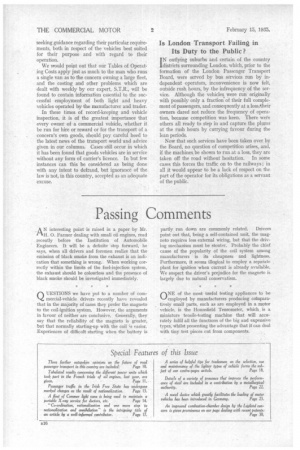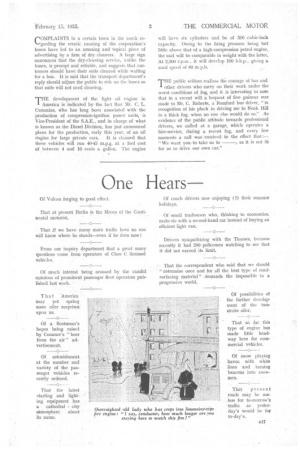Passing Comments
Page 32

Page 33

If you've noticed an error in this article please click here to report it so we can fix it.
AN interesting point is raised in a paper by Mr. H. 0. Farmer dealing with small oil engines, read recently before the Institution of Automobile Engineers. It will be a. definite step forward; he says, when all drivers and foremen realize that the emission of black smoke from the exhaust is an indication that something is wrong. When working correctly within the limits of the fuel-injection system, the exhaust should be colourless and the presence of black smoke should be investigated immediately-.
QUESTIONS we have put to a number of commercial-vehicle drivers recently have revealed that in the majority of cases they prefer the magneto to the coil-ignition system. However, the arguments in favour of neither are conclusive. Generally, they say that the reliability of the magneto is greater, but that normally starting-up with the coil is easier. Experiences of difficult starting when the battery is
partly run down are commonly related. Drivers point out that, being a self-contained unit, the magneto requires less external wiring, but that the driving mechanism must be stouter. Probably the chief cause of the popularity of the coil system among manufacturers is its cheapness and lightness. Furthermore, it seems illogical to employ a separate , plant for ignition when current is already available. We suspect the driver's prejudice for the magneto is largely due to natural conservatism.
ONEof the most useful testing appliances to be employed by manufacturers producing cohiparatively small parts, such as are employed in a motor vehicle, is the Hounsfield Tensometer, which, is a miniature tensile-testing machine that will accurately fulfil all the functions of the big and expensive types, Whilst presenting the advantage that it can deal with tiny test pieces cut from components. COMPLAINTS in a certain town in the north regarding the erratic running of the corporation's buses have led to an amusing and topical piece of advertising by a firm of dry. cleaners. A large sign announces that the dry-cleaning service, unlike the buses, is prompt and reliable, and suggests that customers should have their suits cleaned while waiting for a bus. It is said that the transport department's reply should adjure the public to ride on the buses so that suits will not need cleaning.
THE development of the light oil engine in America is indicated by the fact that Mr. C. L. Cummins, who has long been associated with the production of compression-ignition power units, is Vice-President of the S.A.E., and in charge of what is known as the Diesel Division, has just announced plans for the production, early this year, of an oil engine for large private cars. It is claimed that these vehicles will run 40-45 m.p.g. at a fuel cost of between 4 and 10 cents a gallon. The engine will have six cylinders and be of 300, cubic-inch capacity. Owing to the firing pressure being but little above that of a high-compression petrol engine, the unit will be comparable in weight with the latter. At 2,500 rpm., it will develop 100 b.h.p., giving a road fliced of SO m.p.h.
THE public seldom realizes the courage of bus and other drivers who carry on their work under the worst conditions of fog, and it is interesting to note that in a recent will a bequest of five guineas was made to Mr. C. Roberts, a Romford bus driver, "in recognition of his pluck in driving MC to Nook Hill in a thick fog, when no one else• would do so." As evidence of the public attitude towards professional drivers, we called at a garage, which operates a hire-service, during a recent fog, and every few moments a call was received to the effect that
"We want you to take us to , as it is riot fit for us to drive our own car."




























































































